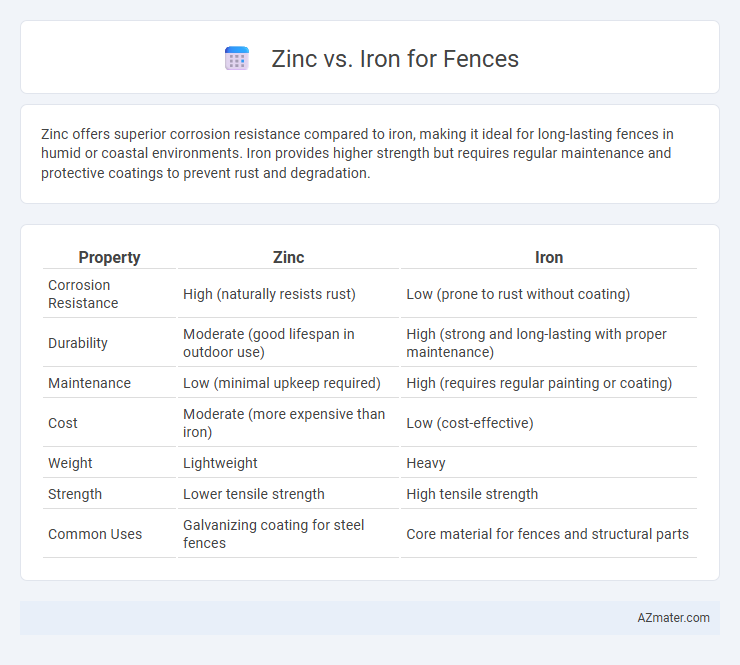Zinc offers superior corrosion resistance compared to iron, making it ideal for long-lasting fences in humid or coastal environments. Iron provides higher strength but requires regular maintenance and protective coatings to prevent rust and degradation.
Table of Comparison
| Property | Zinc | Iron |
|---|---|---|
| Corrosion Resistance | High (naturally resists rust) | Low (prone to rust without coating) |
| Durability | Moderate (good lifespan in outdoor use) | High (strong and long-lasting with proper maintenance) |
| Maintenance | Low (minimal upkeep required) | High (requires regular painting or coating) |
| Cost | Moderate (more expensive than iron) | Low (cost-effective) |
| Weight | Lightweight | Heavy |
| Strength | Lower tensile strength | High tensile strength |
| Common Uses | Galvanizing coating for steel fences | Core material for fences and structural parts |
Introduction: Understanding Zinc and Iron for Fencing
Zinc and iron are common materials used in fencing, each offering distinct properties that affect durability and maintenance. Zinc, often applied as a coating in galvanized fences, provides excellent corrosion resistance by forming a protective barrier against rust. Iron, known for its strength and rigidity, is prone to oxidation without proper treatment, making galvanization or powder coating essential for longevity.
Material Properties: Zinc vs Iron
Zinc offers exceptional corrosion resistance due to its natural ability to form a protective oxide layer, making it ideal for fence coatings and galvanization, whereas iron requires additional treatments to prevent rusting. Iron provides superior tensile strength and durability, suitable for heavy-duty fencing, but is prone to oxidation and structural degradation if not properly maintained. The choice between zinc and iron depends on balancing longevity with strength, where zinc serves primarily as a protective barrier, while iron acts as the core structural material.
Durability and Longevity Comparison
Zinc-coated fences offer superior corrosion resistance, significantly enhancing durability by preventing rust and extending their lifespan in harsh weather conditions. Iron fences, while structurally strong, are prone to oxidation and require frequent maintenance or protective coatings to prevent rust damage. Ultimately, zinc fencing ensures longer longevity with minimal upkeep compared to iron, making it a cost-effective choice for durable outdoor barriers.
Corrosion Resistance: Which Prevails?
Zinc outperforms iron in corrosion resistance due to its natural ability to form a protective oxide layer that prevents rust and degradation over time. Iron, while strong, is highly susceptible to oxidation and requires protective coatings to withstand exposure to moisture and environmental elements. Galvanized fences, coated with zinc, offer superior longevity and minimal maintenance compared to untreated iron fences prone to rust.
Maintenance Requirements: Zinc vs Iron Fences
Zinc-coated fences, often galvanized steel, require minimal maintenance due to their corrosion-resistant properties, preventing rust and extending lifespan with occasional cleaning. Iron fences demand regular upkeep, including rust removal, repainting, and protective coatings to avoid deterioration from moisture exposure. Choosing zinc over iron significantly reduces maintenance time and costs while ensuring long-term durability.
Cost Analysis: Initial Investment and Long-Term Value
Zinc-coated fences typically require a higher initial investment due to the cost of galvanization, but they offer superior corrosion resistance, reducing maintenance expenses over time. Iron fences are generally less expensive upfront but are prone to rust, leading to frequent repairs and repainting that increase lifetime costs. Evaluating total cost of ownership, zinc fencing provides better long-term value through durability and lower upkeep.
Environmental Impact: Sustainability of Zinc and Iron
Zinc coatings for fences offer superior corrosion resistance, significantly extending the lifespan of iron structures and reducing the need for frequent replacements, which lowers environmental waste. Iron production typically involves higher energy consumption and releases more carbon emissions compared to zinc's more energy-efficient extraction and processing methods. Utilizing zinc-coated iron fences promotes sustainability by combining the durability of iron with the eco-friendliness of zinc, resulting in a longer-lasting, recyclable fencing solution with a reduced overall carbon footprint.
Aesthetic Differences and Design Options
Zinc-coated fences offer a sleek, modern appearance with a smooth, matte finish that resists corrosion and maintains its aesthetic appeal over time, ideal for contemporary design schemes. Iron fences provide a classic, ornate look with intricate detailing possibilities, allowing for customized decorative elements such as scrolls and finials that enhance traditional landscaping. Design options for zinc emphasize minimalist, industrial styles, while iron fencing supports both elaborate Victorian designs and rustic, vintage aesthetics.
Common Applications: Residential vs Commercial Fencing
Zinc-coated fences, commonly referred to as galvanized fences, are widely used in residential fencing due to their excellent corrosion resistance and low maintenance requirements, making them ideal for home gardens and boundary demarcation. Iron fences, often made from wrought iron or steel, are preferred in commercial fencing applications for their superior strength and security features, suited for industrial sites, parks, and high-traffic areas. Residential fences benefit from zinc's affordability and rust prevention, while commercial fencing leverages iron's durability and resistance to physical impact.
Choosing the Best Metal for Your Fence
Zinc offers superior corrosion resistance compared to iron, making it ideal for fences exposed to harsh weather conditions. Iron provides exceptional strength and durability but requires regular maintenance to prevent rust and prolong its lifespan. For long-term performance, zinc-coated or galvanized iron fences combine the toughness of iron with the protective benefits of zinc.

Infographic: Zinc vs Iron for Fence
 azmater.com
azmater.com